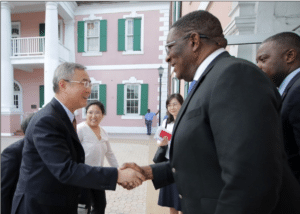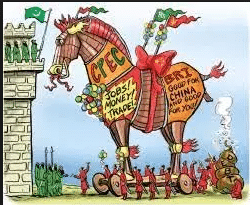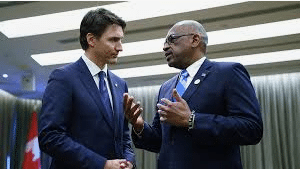Developing nations (still) harbor illusions about China enabling them to emulate its economic success. But the record shows that, through its “debt-trap” diplomacy, China is merely ensnaring those nations into mercantile servitude.
 That’s why the following smacks of begging for voluntary vassalage:
That’s why the following smacks of begging for voluntary vassalage:
House Speaker Halson Moultrie yesterday recommended to a People’s Republic of China delegation that its country consider developing the southeast region of the Bahamas to shift the population concentration from the northwest Bahamas.
‘I also recommended that we should take a look at removing the correctional facilities out of the capital and putting it in one of the remote places in The Bahamas and I suggested Little Inagua of course because that is strategically positioned at the gateway to The Bahamas from the south.’
(The Nassau Tribune, September 20, 2019)
Mind you, China is infamous for building political internment camps masquerading as criminal correctional facilities. And one could see it prevailing upon the Bahamian government to “relocate” any would-be Patrick Henry who cries out against turning The Bahamas into a vassal province of China.
Indeed, it’s a wonder Speaker Moultrie did not also recommend that a treaty to this effect would be “mutually beneficial.” Lord knows China already owns more of the country than any other entity. And, as the July 2010 edition of The Bahamas Investor noted, mandarin has become the preferred second language among (educated) Bahamians. This, thanks to Chán-style proselytizing by The Confucius Institute, which China established at the University of The Bahamas ten years ago this month.
 But I cannot overstate the manifest folly of countries blithely inviting the Trojan Horse that is Chinese direct investments. I’ve been sounding alarms in this regard for nearly 15 years. I can refer you to “China Buying Political Dominion Over the Caribbean (Latin America and Africa)!” February 22, 2005, “China Using Loans to ‘Colonize’ Developing World,” August 20, 2018, and too many commentaries in between to count.
But I cannot overstate the manifest folly of countries blithely inviting the Trojan Horse that is Chinese direct investments. I’ve been sounding alarms in this regard for nearly 15 years. I can refer you to “China Buying Political Dominion Over the Caribbean (Latin America and Africa)!” February 22, 2005, “China Using Loans to ‘Colonize’ Developing World,” August 20, 2018, and too many commentaries in between to count.
Thankfully, some countries have taken note. Here, for example, is how Malaysian Prime Minister Mahathir Mohamad explained his objection to China’s neo-colonial terms for investing in developing nations:
We welcome foreign direct investment [but] when it involves giving contracts to China, borrowing huge sums of money from China, and the contract goes to China, and China contractors prefer to use their own workers from China, use everything imported from China, even the payment is not made here, it’s made in China … that kind of contract is not something that I welcome.
(The South China Morning Post, June 20, 2018)
Apropos of this, The Bahamas could look to what has become of Sri Lanka and Djibouti. Because China parlayed major infrastructure investments into a neo-colonial leasehold on each country. Except that no country should be more on guard than The Bahamas. After all, China has already induced it to accept the kind of investment contract Mohamad admonished all developing countries to reject.
In fact, I preempted Mohamad by nearly 10 years. For here in part is how I commented on one such contract in “China Putting Squeeze on The Bahamas. Your Country Could Be Next,” October 22, 2010:
____________________
The Bahamas is having a precedent-setting dispute with China over a development agreement, which calls for Chinese men to compose the vast majority of workers on a $2.5 billion project (Baha Mar) that China is funding. …
China is demanding that this small Caribbean nation issue permits for 8,150 Chinese workers (a.k.a. soldiers), which would amount to 71% of the labor force needed for this project; notwithstanding that The Bahamas is teeming with unemployed men (and women) who are willing and able to do the work.
Of course, for over a decade now, China has been buying up influence throughout the Caribbean to enable it to exercise its economic, political, and, perhaps, even military power to further its national interests without question … let alone challenge. And nothing demonstrated its modus operandi in this respect quite like the way it allegedly bribed (or attempted to bribe) every nation in the region to sever ties with Taiwan: almost all of them, including The Bahamas, duly complied.
But the leaders of every one of these nations knew, or should have known, that, sooner or later, China would seek to use its influence in ways that were inimical to their national interests. And, lest anyone thinks I’m making too much of this, bear in mind that I had just cause to sound the alarm earlier this year in ‘World Beware: China Calling in (Loan-Sharking) Debts,’ February 19, 2010.
There’s no gainsaying the principle at issue; namely, that no matter the developer or financier, the percentage of local to foreign workers on all development projects should be at least 70:30; i.e., in favor of local workers, not the other way around.
____________________
But nothing betrays China’s mercantile intent quite like its highly publicized but relatively paltry $100,000 donation for Hurricane Dorian relief. Because one need only juxtapose that with the naturally discreet but far more substantial donation Japan made:
The donation included 50 tents, 1,000 foldable tanks, 30 water storage tanks, 100 plastic sheets and 2,600 blankets to be dispatched immediately to hurricane victims in Abaco and Grand Bahama.
This comes after Japan gifted the Bahamas with $2m worth of emergency equipment as part of a grant aid project last year.
(The Nassau Tribune, September 11, 2019)
 Given that, I welcome the alarm no less a person than US Senator Marco Rubio is sounding in the wake of Hurricane Dorian.
Given that, I welcome the alarm no less a person than US Senator Marco Rubio is sounding in the wake of Hurricane Dorian.
The United States cannot allow China to exploit the recovery and rebuilding of The Bahamas after Hurricane Dorian for its own nefarious purposes and gain ‘a foothold just 50 miles from the coast of Florida,’ US Senator Marco Rubio said on Saturday.
‘The goal is to leave nations beholden to Beijing for decades to come. It’s debt-trap diplomacy.’
(The Nassau Guardian, September 16, 2019)
Clearly, the categorical imperative is for not just The Bahamas but the United States to thwart China’s neo-colonial ambitions. Because China seems hell-bent on colonizing poor countries in the 21st Century economically/technologically the way Britain colonized them in the 19th century politically/militarily.
But Rubio’s alarm compels me to reprise my warning to all countries that are not just lapping up China’s largesse, but heralding it as a more worthy superpower than the United States. It is from the aforementioned “China Buying Up Political Dominion,” February 22, 2005:
____________________
What happens if China decides that it is in its strategic national interest to convert the container ports, factories and chemical plants it has funded throughout the Caribbean into dual military and commercial use? Would these governments comply? Would they have any real choice? And when they do comply, would the US then blockade the entire region – as it blockaded Cuba during the missile crisis?
Now, consider China making such strategic moves in Latin America where its purportedly benign Yuan diplomacy dwarfs its Caribbean operations. This new Cold War could then turn very hot indeed.
____________________
That said, I’ve suggested in many commentaries that developing nations would do well to play the United States off against China to get billions in unconditional aid; you know, the way they played the United States off against the Soviet Union during the Cold War. The Bahamas is well positioned to do this, especially given the international cause celebre Hurricane Dorian relief has become.
 Unfortunately, as long as Donald Trump is president, the United States might be all too willing to let China have its way with “shithole countries” from Africa to Latin America and all Caribbean countries in between. Therefore, The Bahamas would do well to appeal variously to the EU and Canada to play the role the United States seems hell-bent on defaulting … for now.
Unfortunately, as long as Donald Trump is president, the United States might be all too willing to let China have its way with “shithole countries” from Africa to Latin America and all Caribbean countries in between. Therefore, The Bahamas would do well to appeal variously to the EU and Canada to play the role the United States seems hell-bent on defaulting … for now.
Incidentally, protesters have returned to Tahrir Square. Much to his shock and dread, Egypt’s latest de facto dictator, Abdel Fattah el-Sisi, is realizing that it’s not so easy these days to misappropriate foreign aid for personal use; you know, the way his most famous predecessor Hosni Mubarak and other Third World despots did so ostentatiously. This is why there seems little chance that Bahamian Prime Minister Hubert Minnis would even attempt to ape those despots in this respect.
In any event, countries beware the dressaging Chinese gift horse!
Related commentaries:
Hurricane Dorian…
China dominion…
China colonizing…
China squeeze…
el-Sisi…
shithole countries…


